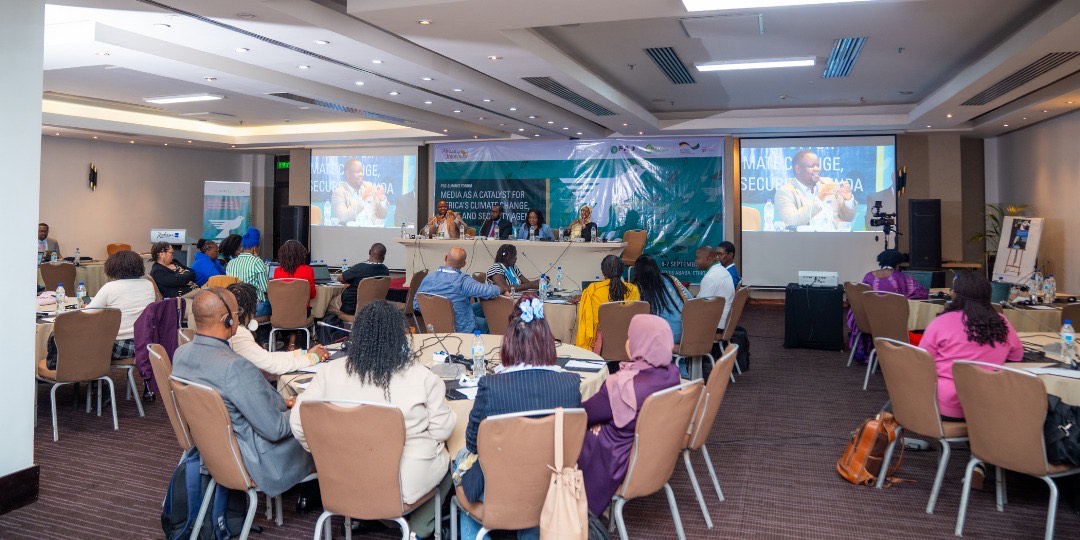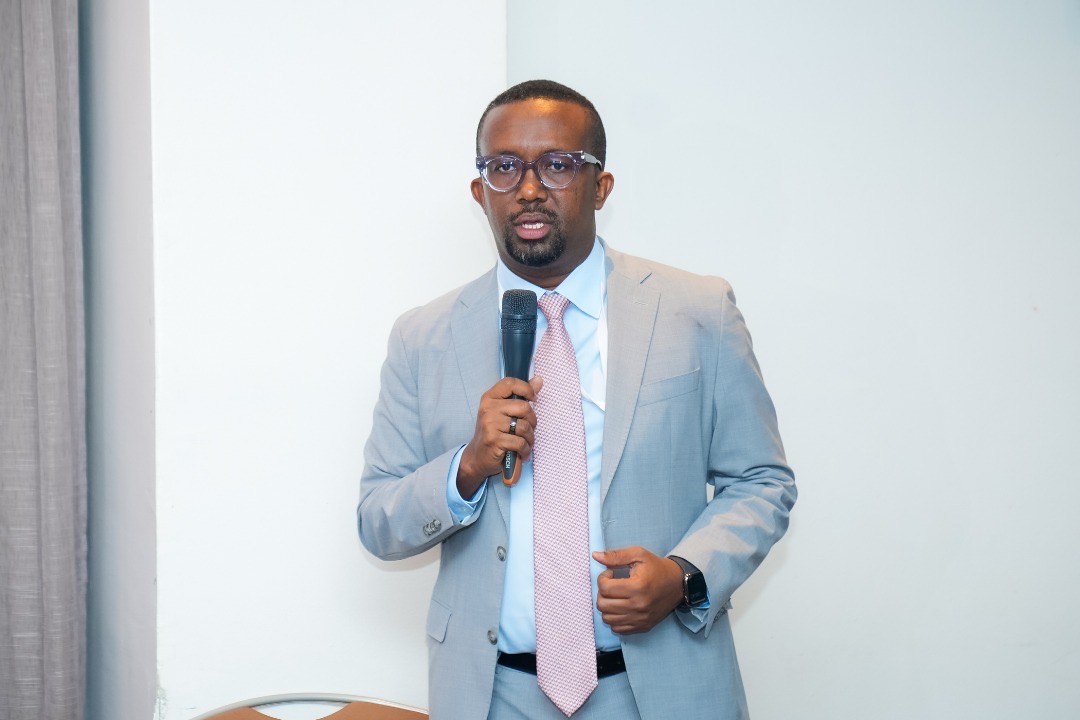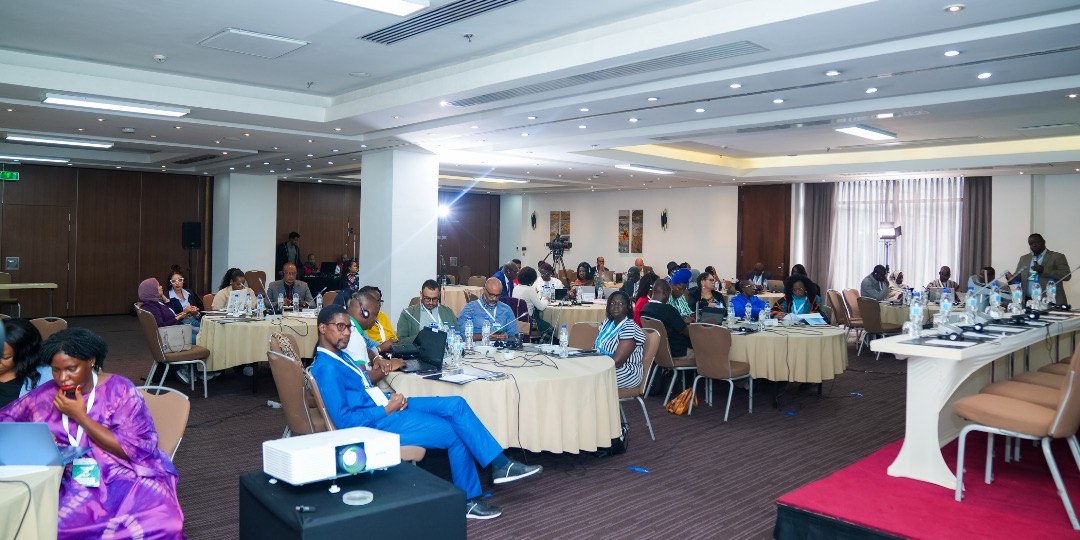By Promise Twinamukye
During a two-day pre-summit to the Second Africa Climate Summit (ACS-2), the theme ‘Media as a catalyst for Africa’s climate change, peace and security agenda: Driving just transition and climate justice, was not chosen lightly.
Across Africa, climate shocks are colliding with fragile governance, economic pressures, and social inequalities. What role can journalists play in this rollercoaster mix?
Organized by the Federation of African Journalists, African Union, supported by Oxfam and German Development Cooperation, the pre-summit gathered more than 50 journalists from across Africa, policy makers and civil society representatives.
The agenda had topics ranging from panels on the climate, peace, security nexus, thematic dialogues on investigative reporting and finance, exchanges on telling Africa’s just transition story, and multi-stakeholder sessions to align media and policy ahead of COP30.
Journalism at the climate peace security nexus
Dr. Richard Muyungi of the African Group of Negotiators reminded delegates that the African Union has already recognized the “inextricable link between climate, peace and security” and is advancing a Common African Position .
“When information is trusted and timely it can reduce tensions, guide early action and support fair policies. Journalism can surface workable solutions, question trade-offs and keep dignity at the centre of decision-making,” Dr. Muyungi says.
The nexus is clear. Drought in Somalia between 2020 and 2023 displaced over a million people and created openings for extremist recruitment. Lake Chad’s shrinkage has destroyed livelihoods, fueling grievances and insecurity. Floods in Libya in 2023 killed over 11,000 and exposed weak governance. These are not abstract policy problems. As one keynote speaker underlined, “without journalists, the climate, peace, security agenda risks remaining an abstract phrase in documents rather than a lived concern capable of mobilizing urgency and action.”

The weight of social policy in the just transition
But journalism cannot tell the climate story in isolation. The pre-summit forum also heard strong calls to embed social policy in climate strategies. One speaker argued that employment, social protection, and environmental policy must move together:
“Social protection is not a luxury. It is the foundation for resilience. In Africa, less than 10% of the population has access to any form of social protection. When people lose their jobs or face climate shocks, they are left without support. That must change.”
Globally, an estimated 78 million workers will need retraining as economies transition. For Africa, where informality dominates, the challenge is sharper. Without investment in skills, protections, and fair financing, a “green transition” risks deepening inequality.
Here again, the media must scrutinize trade-offs, keep pressure on governments and banks, and amplify the voices of workers navigating change.
Information Integrity
Access to environmental data and transparent decision-making were described as cornerstones of climate justice. Delegates were reminded that principles from the 1990s already enshrined public participation and information access. Yet today, over 20 countries still lack freedom-of-information laws.
Speakers warned that disinformation, whether blaming floods on divine punishment or framing pastoral conflicts solely as ethnic rivalries, undermines collective response.
“Access to information is not a technical matter but a human right. States have obligations, but corporations also carry responsibilities to disclose their environmental impacts. Journalists and researchers are essential in turning raw data into public knowledge and accountability,” Elise Nalbandian, Head, Oxfam AU Liaison Office, one of the panelists during the pre-summit says.
A recent initiative drew 540 project proposals from 100 countries on strengthening environmental transparency. This shows a global appetite, but gaps remain, particularly around misinformation, corporate opacity, and the safety of those who report.
A catalyst, not a footnote
By the forum’s close at Radisson Blu hotel in Addis Ababa, it was clear that media is not a bystander in Africa’s climate journey, but a catalyst. Journalists give shape to the abstract, expose injustice in financing, link environmental stress to security risks, and hold leaders accountable for promises made in conference halls.
As Africa looks to ACS-2 and COP30, the Addis forum reminded the globe that climate justice and peace will not be achieved by policy alone.
According to Omar Faruk Osman, President of the Federation of African Journalists (FAJ),this will be achieved when stories are told accurately, courageously, and inclusively, when media helps citizens see their struggles and their resilience reflected in the broader continental narrative.

